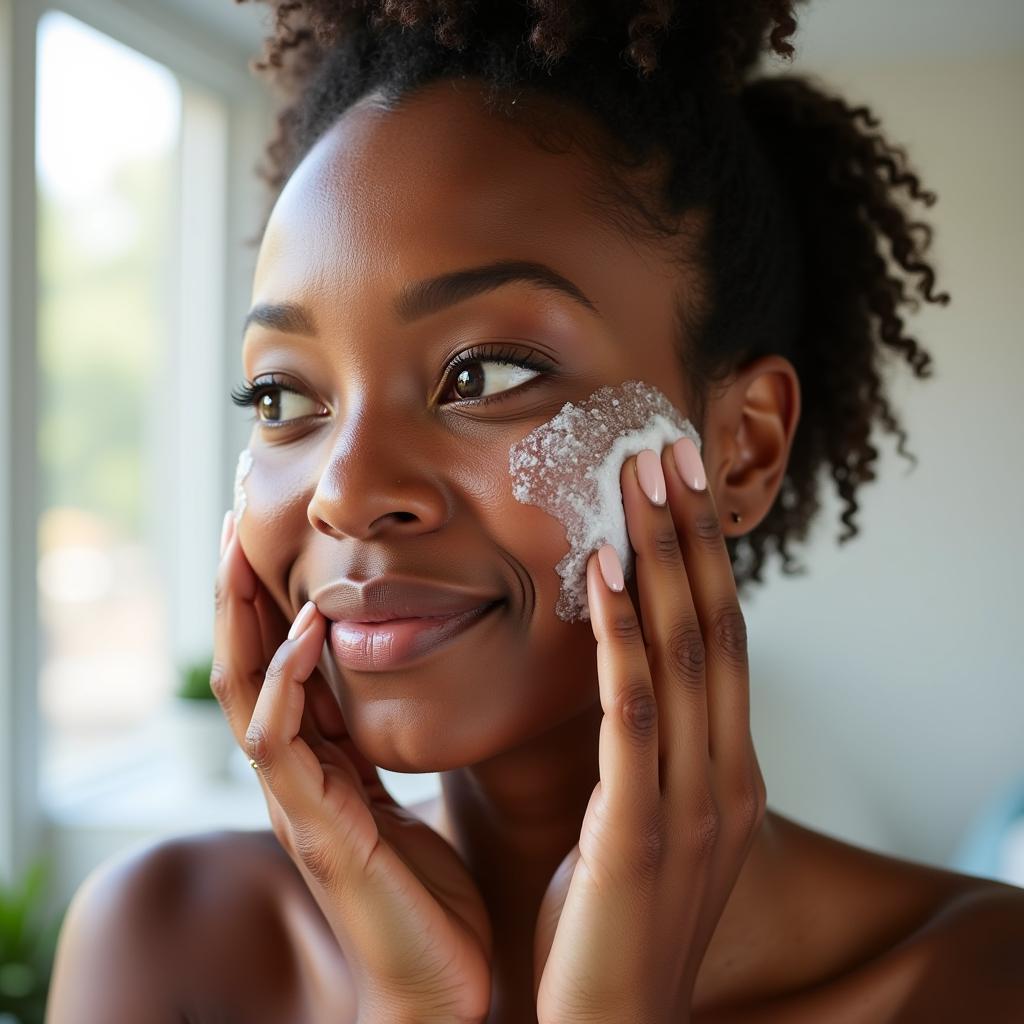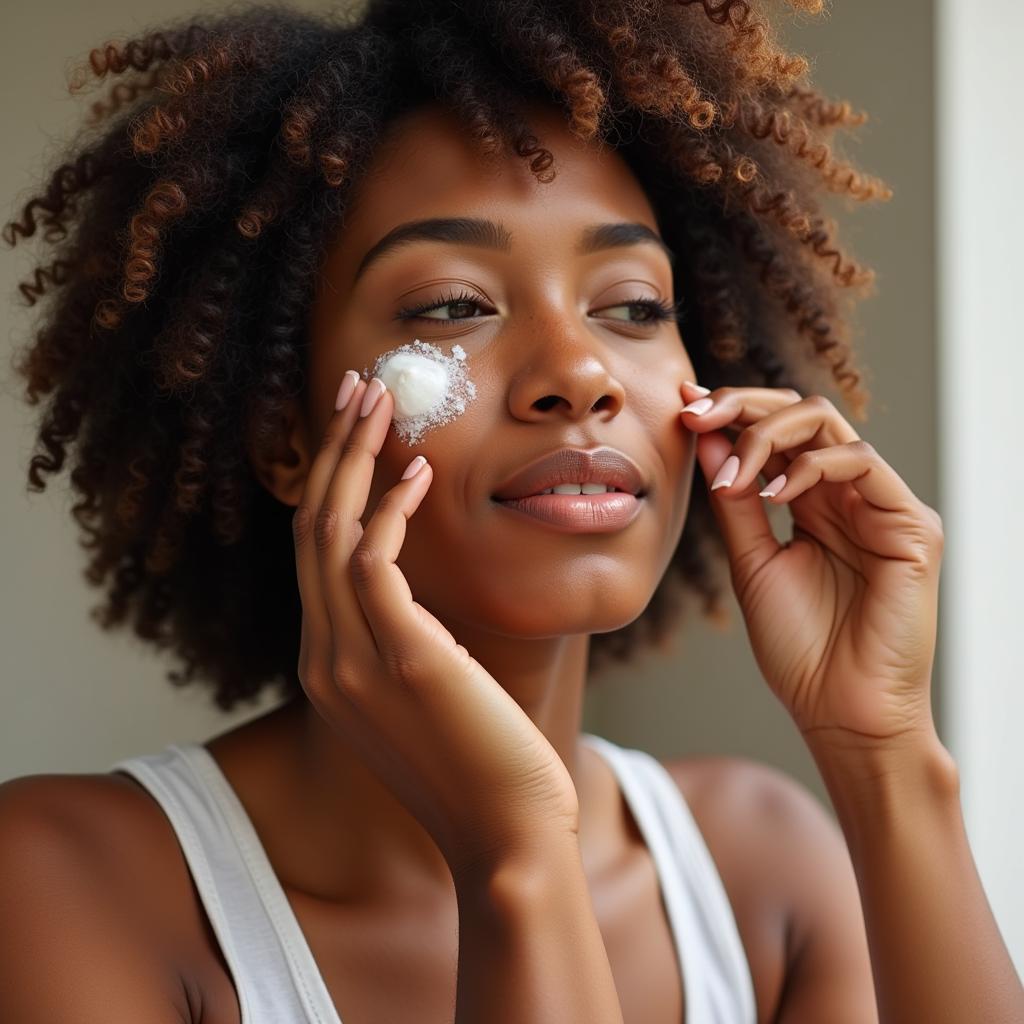African American Dry Skin Care: A Guide to Nourishing Melanin-Rich Skin
Dry skin is a common concern for many, but for those with melanin-rich skin, the struggle can feel even more real. African American skin has unique needs and requires tailored skincare routines to address dryness effectively. This comprehensive guide delves into the specific needs of African American dry skin and provides expert tips to achieve a healthy, radiant complexion.
Understanding African American Skin
African American skin, like all skin types, has its own set of characteristics. Understanding these characteristics is crucial for creating an effective dry skincare regimen.
Melanin: A Double-Edged Sword
Melanin, the pigment that gives our skin its color, plays a significant role in protecting us from the sun’s harmful UV rays. African American skin naturally has higher melanin levels, offering a degree of built-in sun protection. However, this advantage comes at a cost. Higher melanin content makes African American skin more susceptible to hyperpigmentation, making it essential to address dryness without triggering discoloration.
The Moisture Barrier and Trans Epidermal Water Loss
The outermost layer of our skin acts as a protective barrier, preventing moisture loss and shielding it from external aggressors. This barrier, however, can be compromised by various factors, leading to Trans Epidermal Water Loss (TEWL). For African American skin, factors like using harsh soaps, cold weather, and low humidity can exacerbate TEWL, leading to dryness, itchiness, and a compromised complexion.
Common Causes of Dry Skin in African Americans
Several factors can contribute to dry skin in African Americans, ranging from environmental conditions to underlying health issues.
- Genetics: Some individuals are genetically predisposed to having dry skin due to lower sebum (oil) production.
- Climate: Cold, dry weather, indoor heating, and low humidity can strip the skin of its natural moisture.
- Harsh Soaps and Cleansers: Using soaps with high pH levels or harsh chemicals can disrupt the skin’s natural barrier, leading to dryness and irritation.
- Hot Showers and Baths: While tempting, prolonged exposure to hot water can dehydrate the skin.
- Underlying Medical Conditions: Certain skin conditions like eczema and psoriasis can cause dry, flaky patches.
Choosing the Right Products for African American Dry Skin
Navigating the world of skincare can feel overwhelming, especially with countless products claiming to be the holy grail. Selecting the right products for African American dry skin requires understanding key ingredients and their benefits.
- Hyaluronic Acid: This powerhouse ingredient acts like a sponge, drawing moisture from the air and locking it into the skin, ensuring long-lasting hydration.
- Ceramides: These lipids play a vital role in maintaining the skin’s protective barrier, preventing moisture loss and shielding against external irritants.
- Shea Butter: A rich source of fatty acids and vitamins, shea butter deeply moisturizes and nourishes dry skin, promoting a healthy, radiant complexion.
- Glycerin: Similar to hyaluronic acid, glycerin attracts and retains moisture, improving skin hydration and elasticity.
Building a Simple yet Effective Skincare Routine
Creating a skincare routine doesn’t need to be complicated. For African American dry skin, a simple yet effective routine should focus on gentle cleansing, deep hydration, and sun protection.
1. Gentle Cleansing: The Foundation of Healthy Skin
- Opt for a gentle, sulfate-free cleanser specifically formulated for dry or sensitive skin.
- Avoid using hot water, as it can further strip the skin of its natural oils.
- Cleanse your face twice daily, once in the morning and once at night, to remove dirt, makeup, and impurities without over-drying.
 Woman Cleansing Her Face
Woman Cleansing Her Face
2. Hydration is Key: Replenishing Moisture Loss
- After cleansing, apply a hydrating toner to restore the skin’s pH balance and prep it for subsequent products.
- Follow with a serum containing hyaluronic acid to draw moisture to the skin and keep it plump and hydrated.
- Layer a moisturizer rich in ceramides and shea butter to seal in moisture and strengthen the skin’s protective barrier.
3. Sun Protection: Shielding Your Skin Every Day
- Although African American skin has more melanin, it’s still crucial to protect it from the sun’s harmful UV rays.
- Choose a broad-spectrum sunscreen with an SPF of 30 or higher and apply it liberally to all exposed skin daily, even on cloudy days.
- Reapply sunscreen every two hours, especially after swimming or sweating.
 Woman Applying Sunscreen
Woman Applying Sunscreen
Lifestyle Changes for Healthy Skin
While skincare products play a vital role, adopting certain lifestyle habits can significantly improve your skin’s health from the inside out.
- Hydration is Key: Drink plenty of water throughout the day to keep your skin and body well-hydrated.
- Eat a Balanced Diet: Consume a diet rich in fruits, vegetables, and healthy fats to nourish your skin from within.
- Manage Stress: Chronic stress can wreak havoc on your skin. Explore stress-reducing activities like yoga, meditation, or spending time in nature.
- Avoid Smoking: Smoking constricts blood vessels, reducing blood flow to the skin and leading to premature aging and dryness.
- Limit Alcohol Consumption: Excessive alcohol consumption can dehydrate your skin and body.
Conclusion
Achieving healthy, radiant skin is an ongoing journey that requires understanding your skin’s unique needs and adopting a consistent skincare routine. By following these tips and making conscious lifestyle choices, you can effectively address dry skin and embrace the beauty of your melanin-rich complexion. Remember, healthy skin is not just about aesthetics; it’s a reflection of overall well-being.
If you’re looking for more targeted advice on caring for your African American skin, check out our other resources:
- African American Natural Hair Care Recipes
- African American Anti Aging Skin Care
- African American Acne Dark Spots
Taking care of your skin is a journey, and understanding your specific needs is the first step. By addressing dryness and nourishing your skin, you can achieve a healthy, radiant complexion that reflects your inner beauty.

